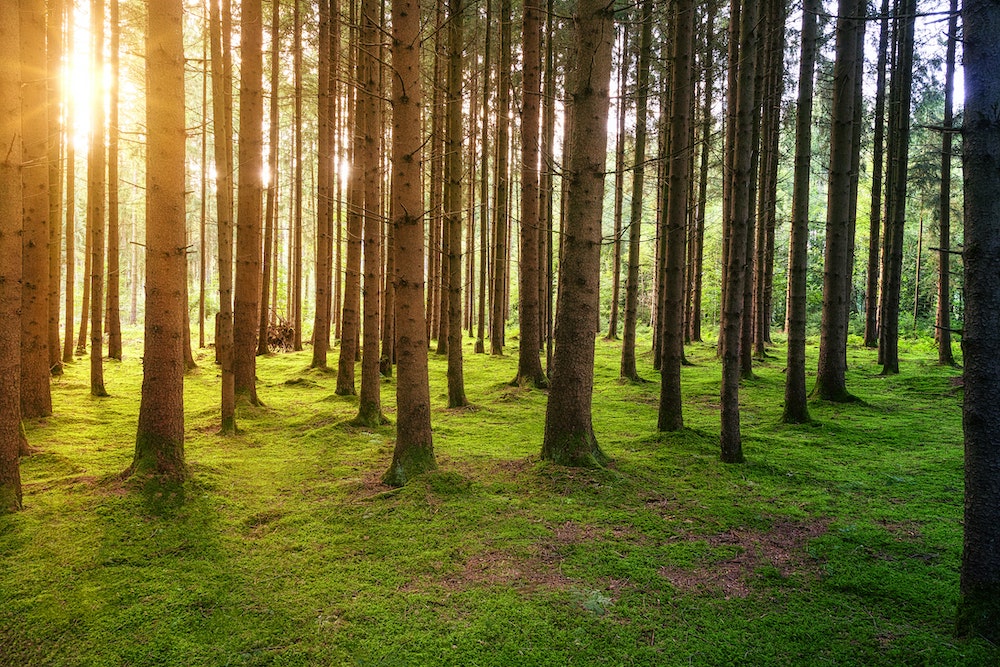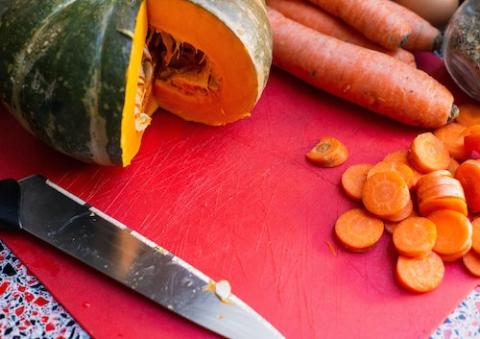
The concept of kinship with all beings has a long history in religious traditions. (Unsplash/Johannes Plenio)
In February 2019, newly sworn U.S. congresswoman Alexandria Ocasio-Cortez peered into a camera in her compact kitchen as she worked at a cutting board. Her casual meal prep gave no hint of the arresting question on her mind.
Speaking for 36 seconds to 2.5 million Instagram followers, Ocasio-Cortez waded into a moral debate virtually unknown to previous human generations but now heard increasingly across the globe. The scientific consensus that life is about to get very difficult because of climate change, she observed, is leading young people to ask, "Is it ok to still have children?"
This breathtaking query captures poignantly the unease that defines our age. In the face of climate catastrophes, species extinctions, melting icecaps, and other perils collectively labeled an "existential threat" to humanity, many people carry a strong sense of foreboding.
The American Psychological Association calls this concern "eco-anxiety." It is a worrisome affliction at a time when humanity needs to step up with its best self. How might the human family avoid a descent into despair and hopelessness?
A million miles from global sustainability worries, the work of Jesuit Fr. Greg Boyle offers helpful if unexpected guidance. At Homeboy Industries in the Mission Dolores district of Los Angeles, Boyle encounters grief, heartbreak, poverty, violence and poor life prospects for the gang members he works with.
Yet he does not despair. Boyle wears a hopefulness rooted in his faith and, specifically, in a healing balm he calls radical kinship, a relational sense of oneness and connectedness, the idea that there is no "us and them," only "us."
Radical kinship as articulated by Boyle embraces community, inclusion, dignity, mutuality and interconnection, characteristics that land warmly, perhaps because they suggest relationship, even nesting.
Indeed, Boyle's characteristics of kinship are remarkably ecological. Could it be that radical kinship is not merely a balm for wounded neighborhoods, but a broad remedy for healing a damaged Earth?
Advertisement
Indigenous peoples and many Eastern religious traditions have long understood humanity as kin to all of nature. So did Francis of Assisi and Catholic thinkers, including Pierre Teilhard de Chardin and Thomas Berry.
For St. Francis, the oaks and songbirds of the Umbrian countryside were family, in a relational web centered on God — his "Canticle of Creation" praises God through Brother Sun, Sister Moon and Mother Earth.
Yet for industrial peoples, serious embrace of Francis' kinship framework is a major shift in worldview, because it rejects the modern view that nature is merely a supply depot for human projects and a stage for our play. A Franciscan kin-based perspective teaches us to see Creation as God's self-expression and gift. It teaches us to love Creation.
What might a civilization of kinship look like in practice? Certainly it questions the foundations of our current economy, which often harm planet and people alike. Many of our non-human kin fare poorly under an economic system premised on ever-greater growth and one-time use of resources.
What is environmental degradation but evidence of systematic pillage by a voracious economic system whose hunger is never satisfied? And what is poverty but evidence of systematic neglect amid unprecedented abundance? Consider: Chronic hunger afflicts 800 million people or more annually, and has for decades, despite a world of economic and agricultural plenty.
Economies based on kinship would not tolerate pillage of the planet and neglect of its people. A kinship economy would mimic nature in its operations, creating circular flows of materials and relying on renewable sources of energy.
It would use pollution taxes, incentives for recycling and remanufacturing, land trusts and other market shapers to protect our kin in nature. It would also feature solidarity, prioritizing care for our human kin through the use of worker cooperatives, public banks, social enterprise, impact investing, time banks and other tools that promote equity and justice.
An economic makeover with kinship as a driving value would demonstrate that we hear clearly the cry of the Earth and the cry of the poor.

Meal preparation evokes sharing. (Unsplash/Louis Hansel)
Importantly, Boyle speaks of radical kinship, a kinship rooted in God, the source of all life. In an alternative framing of this historic moment — a new world of radical kinship — the adjective "radical" adds depth and strength to our sustainability goal.
We seek not just better relations with our brothers and sisters, human and non-, but an inclusive adventure on this Earth that finds its energy in our ultimate rootedness in God.
Boyle quotes a keen insight from Joseph Campbell: "if you want to change the world, change the metaphor." Radical kinship is a new metaphor.
Through it, gang members in Mission Dolores become sisters and brothers in need of healing, rather than criminals in need of reform. And humanity's stance before nature becomes relational, as we learn to love creation and engage with its kinfolk for mutual benefit rather than for mere exploitation.
Through radical kinship we address our fundamental woundedness, diagnosed by Mother Teresa and repeated by Boyle: "We have forgotten that we belong to each other."
Toward the end of her "OK to have children?" kitchen video, Alexandria Ocasio-Cortez shifts position, revealing the counter behind her. There, next to the coffee pot, sits a jar candle. It is white and it is large — arguably too much for the tight counter space, and seemingly out of place in a kitchen.
Yet there it is. Not just there, but lit, its flame strong and flickering with life, a quiet but powerful icon of hope amid Ocasio-Cortez's existential worry. Does it whisper, in soft response to her angst, that a future supportive of human dignity is still possible, that new chapters in our long human adventure on this planet remain to be written?
Perhaps. Indeed, maybe the candle is not inappropriate to the kitchen at all. Perhaps it casts Ocasio-Cortez's mundane kitchen work in a new light.
Meal prep, after all, evokes kinship, community and the sharing of bounty, relational values that link people, nature and the spirit of God. These are values of deep energy. Could they be the prescription for restoring our planetary home and filling it with civilizations built around human dignity?
[Gary Gardner was a long-time researcher at the Worldwatch Institute and is a consultant to GreenFaith. His forthcoming book, The Earth Cries Out: How Faith Communities Meet the Challenges of Sustainability will be published by Orbis in 2021.]







